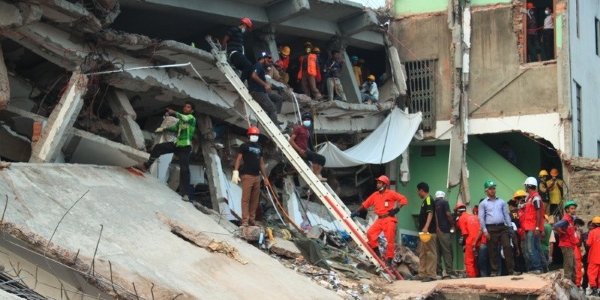Week of Action: Holding Garment Brands Accountable
NLF Highlights for April 17th
This newsletter appears one week in advance of the fifth anniversary of Rana Plaza garment factory collapse, the worst disaster in the history of factory-based garment production. Evidence had been legion of the construction defects of the Rana Plaza factories in the Dhaka District of Bangladesh. In fact, on the morning of April 24th, some of the 3,639 Rana Plaza workers had pointed out large cracks in the factory walls and refused to enter. Factory owner, Sohel Rana, is reported to have threatened the circumspect workers with non payment for the month of April and, with hired goons, forced their entry into the building. Less than an hour later, 1,135 workers perished in the collapsing buildings.
In their trenchant article for New Labor Forum, Rich Appelbaum and Nelson Lichtenstein reveal the great degree of integration between corporate brands and retailers and the manufacturers of the global south that source their product. This global supply chain functions under a legal regime that absolves those brands and retailers of responsibility for the substandard pay and working conditions that undergirds this business model.
This week, from April 18-24, students, union members, consumers, and activists around the world will participate in a Global Week of Action calling on apparel brands to sign the 2018 Accord, a promising initiative discussed in the Appelbaum and Lichtenstein article, to hold powerful retailers and brands responsible for working conditions in supplier factories. In the United States, demonstrations will take place at A&F stores around the country on Saturday, April 21.
Table of Contents
- An Accident in History/ Rich Appelbaum and Nelson Lichtenstein, New Labor Forum
- Global Week of Action/ United Students Against Sweatshops
- Are factories better in Bangladesh after Rana Plaza? That depends on who you ask/ Andrea Crossan and Jasmine Garsd, Public Radio International, The World
- “Rana Plaza” Poem/ Eileen Ridge
An Accident in History
Rich Appelbaum and Nelson Lichtenstein/ New Labor Forum
The collapse of the Rana Plaza garment factory complex near Dhaka in April 2013—killing 1,132 souls and injuring nearly 2,000 more—is unquestionably the most horrific human tragedy in garment industry world history. Whether this enormous loss of life will be balanced by a new era of social reform remains an open question. But it seems just possible that Rana Plaza may well represent the same sort of moral and political shock to an exploitative and dysfunctional production system as did the 1911 Triangle Shirtwaist fire in New York City, which ushered in a generation of social reform and labor rights. Like the blaze that killed 146 immigrant workers in lower Manhattan, Rana Plaza was an accident but hardly an accident of history. Garment factory fires…
Read the full article here.
Global Week of Action against Abercrombie & Fitch
By United Students Against Sweatshops
During the week of April 18-24, 2018, leading up to the fifth anniversary of the Rana Plaza collapse, students, union members, consumers, and activists around the world will join in a Global Week of Action calling on laggard apparel brands to sign the 2018 Accord. In the United States, we will demonstrate at A&F stores around the country on Saturday, April 21. A&F must sign the renewed Accord and commit to protecting the lives of the people who make their profit possible. Five years ago, on April 24, 2013, the Rana Plaza building collapse in Bangladesh shocked much of the world… At that point in time, Abercrombie & Fitch (A&F) was no stranger to the dangers garment workers faced, because 29 workers sewing for A&F in Bangladesh died in the 2010 That’s It Sportswear factory fire…
More information here.
Are factories better in Bangladesh after Rana Plaza? That depends on who you ask
By Andrea Crossan and Jasmine Garsd/ Public Radio International, The World
What if she hadn’t lost her shoe that day? Arati Baladas wonders about this sometimes. Baladas is 20, and she sometimes replays in her mind that moment on April 24, 2013, when she scrambled to find her missing sandal, as the walls and the ceiling around her crumbled. She was working at her sewing machine when she heard a loud bang. She says the building “shivered.” Her supervisor told everyone to run. Baladas who often slipped her shoes off at work, searched for her sandal. “Just run!” her supervisor said. She sprinted, and tripped. She doesn’t remember anything else. On that morning, the Rana Plaza garment factory complex…
Listen to the full podcast here.
Rana Plaza Poem
By Elieen Ridge
 The tag said
The tag said
Made in Bangladesh
The price was less than
A Starbucks cup
Outside the store
Shoppers shuffled past
Plate glass windows
Offering fall looks from $9.95
Inside, this dress
This cotton blend with
No obvious sign of distress
Bore no specific address…
Read the full poem here.
Subscribe to New Labor Forum
Do you subscribe to New Labor Forum, our publication for labor and its allies to test and debate new ideas? In this new year, consider giving your favorite friends and colleagues a subscription too. Three times a year scholars, journalists, labor leaders and activists explore topics like the global economy’s impact on work and labor; new union organizing and political strategies; labor’s new constituencies and their relationship to organized labor’s traditional institutions; internal union reform and new structural models for the labor movement; alternative economic and social policies; and the role of culture in a new, revitalized labor movement. It is required reading for anyone who is concerned with issues of work, workers, and social change. Subscribe now to get each issue of New Labor Forum.



